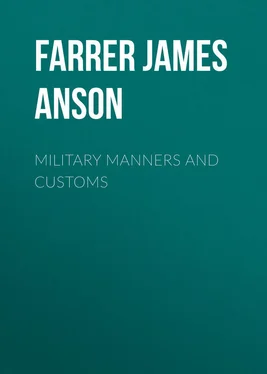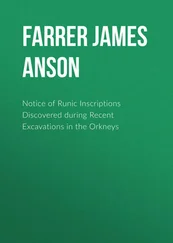James Farrer - Military Manners and Customs
Здесь есть возможность читать онлайн «James Farrer - Military Manners and Customs» — ознакомительный отрывок электронной книги совершенно бесплатно, а после прочтения отрывка купить полную версию. В некоторых случаях можно слушать аудио, скачать через торрент в формате fb2 и присутствует краткое содержание. Жанр: foreign_antique, foreign_prose, на английском языке. Описание произведения, (предисловие) а так же отзывы посетителей доступны на портале библиотеки ЛибКат.
- Название:Military Manners and Customs
- Автор:
- Жанр:
- Год:неизвестен
- ISBN:нет данных
- Рейтинг книги:5 / 5. Голосов: 1
-
Избранное:Добавить в избранное
- Отзывы:
-
Ваша оценка:
- 100
- 1
- 2
- 3
- 4
- 5
Military Manners and Customs: краткое содержание, описание и аннотация
Предлагаем к чтению аннотацию, описание, краткое содержание или предисловие (зависит от того, что написал сам автор книги «Military Manners and Customs»). Если вы не нашли необходимую информацию о книге — напишите в комментариях, мы постараемся отыскать её.
Military Manners and Customs — читать онлайн ознакомительный отрывок
Ниже представлен текст книги, разбитый по страницам. Система сохранения места последней прочитанной страницы, позволяет с удобством читать онлайн бесплатно книгу «Military Manners and Customs», без необходимости каждый раз заново искать на чём Вы остановились. Поставьте закладку, и сможете в любой момент перейти на страницу, на которой закончили чтение.
Интервал:
Закладка:
The rules of war which prevailed in the time of Grotius – the early time of the Thirty Years’ War – may be briefly summarised from his work as follows. The rights of war extended to all persons within the hostile boundaries, the declaration of war being essentially directed against every individual of a belligerent nation. Any person of a hostile nation, therefore, might be slain wherever found, provided it were not on neutral territory. Women and children might be lawfully slain (as it will be shown that they were also liable to be in the best days of chivalry); and so might prisoners of war, suppliants for their lives, or those who surrendered unconditionally. It was lawful to assassinate an enemy, provided it involved no violation of a tacit or express agreement; but it was unlawful to use poison in any form, though fountains, if not poisoned, might be made undrinkable. Anything belonging to an enemy might be destroyed: his crops, his houses, his flocks, his trees, even his sacred edifices, or his places of burial.
That these extreme rights of war were literally enforced in the seventeenth century admits of no doubt; nor if any of them have at all been mitigated, can we attribute it so much to the humane attempt of Grotius and his followers to set restrictions on the rightful exercise of predominant force, as to the accidental influence of individual commanders. It has been well remarked that the right of non-combatants to be unmolested in war was recognised by generals before it was ever proclaimed by the publicists. 30 30 Bluntschli’s Modernes Völkerrecht , art. 573.
And the same truth applies to many other changes in warfare, which have been oftener the result of a temporary military fashion, or of new ideas of military expediency, than of obedience to Grotius or Vattel. They set themselves to as futile a task as the proverbial impossibility of whitening the negro; with this result – that the destructiveness of war, its crimes, and its cruelties, are something new even to a world that cannot lose the recollection of the sack of Magdeburg in 1631, or the devastation of the Palatinate in 1689. 31 31 For the character of modern war see the account of the Franco-German war in the Quarterly Review for April 1871.
The publicists have but recognised and reflected the floating sentiments of their time, without giving us any definite principle by which to separate the permissible from the non-permissible practice in war. We have seen how much they are at issue on the use of poison. They are equally at issue as to the right of employing assassination; as to the extent of the legitimate use of fraud; as to the right of beginning a war without declaration; as to the limits of the invader’s rights of robbery; as to the right of the invaded to rise against his invader; or as to whether individuals so rising are to be treated as prisoners of war or hanged as assassins. Let us consider what they have done for us with regard to the right of using savages for allies, or with regard to the rights of the conqueror over the town he has taken by assault.
The right to use barbarian troops on the Christian battle-field is unanimously denied by all the modern text-writers. Lord Chatham’s indignation against England’s employment of them against her revolted colonies in America availed as little. Towards the end of the Crimean war Russia prepared to arm some savage races within her empire, and brought Circassians into Hungary in 1848. 32 32 Halleck, ii. 22.
France employed African Turcos both against Austria in 1859 and against Prussia in 1870; and it is within the recollection of the youngest what came of the employment by Turkey of Bashi-Bazouks. Are they likely not to be used in future because Bluntschli, Heffter, or Wheaton prohibits them?
To take a town by assault is the worst danger a soldier can have to face. The theory therefore had a show of reason, that without the reward of unlimited licence he could never be brought to the breach. Tilly is said to have replied, when he was entreated by some of his officers to check the rapine and bloodshed that has immortalised the sack of Magdeburg in 1631: ‘Three hours’ plundering is the shortest rule of war. The soldier must have something for his toil and trouble.’ 33 33 Vehse’s Austria , i. 369. Yet, as usual on such occasions, the excesses were committed in the teeth of Tilly’s efforts to oppose them. ‘Imperavit Tillius a devictorum cædibus et corporum castimonia abstinerent, quod imperium a quibusdam furentibus male servatum annales aliqui fuere conquesti.’ – Adlzreiter’s Annales Boicæ Gentis, Part iii. l. 16, c. 38.
It is on such occasions, therefore, that war shows itself in its true character, and that M. Girardin’s remark, ‘ La guerre c’est l’assassinat, la guerre c’est le vol, ’ reads like a revelation. The scene never varies from age to age; and the storming of Badajoz and San Sebastian by the English forces in the Peninsular War, or of Constantine in Algeria by the French in 1837, teaches us what we may expect to see in Europe when next a town is taken by assault, as Strasburg might have been in 1870. ‘No age, no nation,’ says Sir W. Napier, ‘ever sent forth braver troops to battle than those who stormed Badajoz’ (April 1812). Yet for two days and nights there reigned in its streets, says the same writer, ‘shameless rapacity, brutal intemperance, savage lust, cruelty, and murder.’ 34 34 Battles in the Peninsular War , 181, 182.
And what says he of San Sebastian not a year and a half later? A thunderstorm that broke out ‘seemed to be a signal from hell for the perpetration of villany which would have shamed the most ferocious barbarians of antiquity.’ … ‘The direst, the most revolting cruelty was added to the catalogue of crime: one atrocity … staggers the mind by its enormous, incredible, indescribable barbarity.’ 35 35 Ibid. 396.
If officers lost their lives in trying to prevent such deeds – whose very atrocity, as some one has said, preserves them from our full execration, because it makes it impossible to describe them – is it likely that the gallant soldiers who crowned their bravery with such devilry would have been one whit restrained by the consideration that in refusing quarter, or in murdering, torturing, or mutilating non-combatants, they were acting contrary to the rules of modern warfare?
If, then, we temper theory with practice, and desert our books for the facts of the battle-field (so far as they are ever told in full), we may perhaps lay down the following as the most important laws of modern warfare:
1. You may not use explosive bullets; but you may use conical-shaped ones, which inflict far more mutilation than round ones, and even explosive bullets if they do not fall below a certain magnitude.
2. You may not poison your enemy, because you thus take from him the chance of self-defence: but you may blow him up with a fougass or dynamite, from which he is equally incapable of defending himself.
3. You may not poison your enemy’s drinking-water; but you may infect it with dead bodies or otherwise, because that is only equivalent to turning the stream.
4. You may not kill helpless old men, women, or children with the sword or bayonet; but as much as you please with your Congreve rockets, howitzers, or mortars.
5. You may not make war on the peaceable occupants of a country; but you may burn their houses if they resist your claims to rob them of their uttermost farthing.
6. You may not refuse quarter to an enemy; but you may if he be not equipped in a particular outfit.
7. You may not kill your prisoners of war; but you may order your soldiers not to take any.
8. You may not ask a ransom for your prisoners; but you may more than cover their cost in the lump sum you exact for the expenses of the war.
Читать дальшеИнтервал:
Закладка:
Похожие книги на «Military Manners and Customs»
Представляем Вашему вниманию похожие книги на «Military Manners and Customs» списком для выбора. Мы отобрали схожую по названию и смыслу литературу в надежде предоставить читателям больше вариантов отыскать новые, интересные, ещё непрочитанные произведения.
Обсуждение, отзывы о книге «Military Manners and Customs» и просто собственные мнения читателей. Оставьте ваши комментарии, напишите, что Вы думаете о произведении, его смысле или главных героях. Укажите что конкретно понравилось, а что нет, и почему Вы так считаете.












